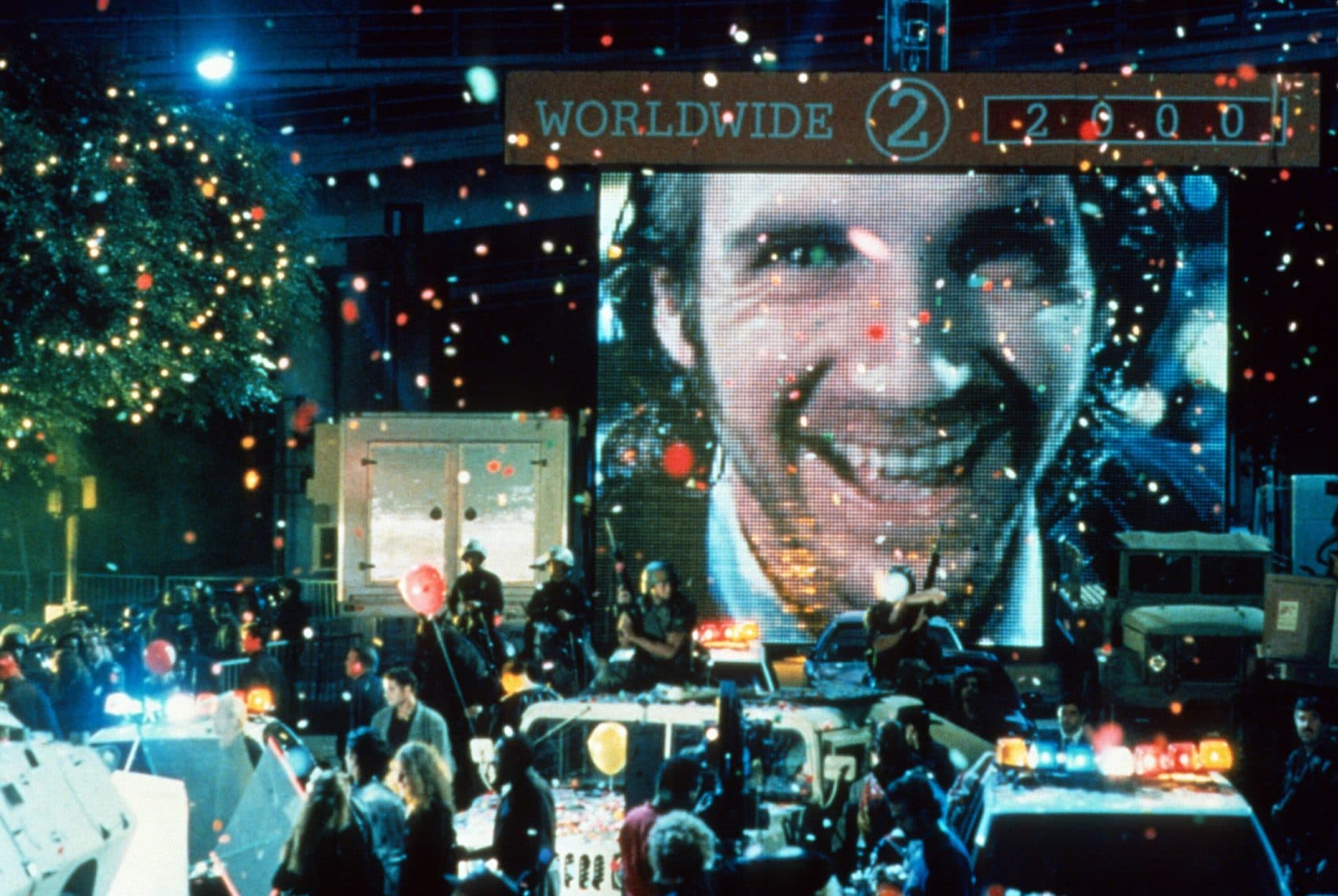Advertisement
Harvard Film Retrospective Gets ‘Caught In The Net’ Of A Frightening Tech Future

They say nothing dates more quickly than a vision of the future. But while pedants giggle at the Pan Am logo in “2001: A Space Odyssey” and pat themselves on the back for pointing out that the airline went bankrupt 10 years prior to when the film takes place, the rest of us like to look at older forecasts with an eye toward analyzing the anxieties of their eras.
The Harvard Film Archive’s delightful retrospective “Caught in the Net: The Early Internet in the Paranoid Imagination” (running through Monday, March 19) has been exploring these past three decades of technology on film. From computer-crazy 1980s pay-cable mainstays like “WarGames” and “Blue Thunder” to “Johnny Mnemonic” — the 1990s Keanu Reeves cyberpunk thriller considerably less celebrated than “The Matrix” — it’s been a fascinating festival of future shock.
The series winds down over the weekend with three of its strongest entries: a trio of underrated techno-thrillers from some of our most exciting contemporary filmmakers. Kathryn Bigelow’s notorious 1995 box office bomb “Strange Days,” Olivier Assayas’ cryptic 2002 art-house oddity “Demonlover” and David Cronenberg’s perversely hilarious 1999 “eXistenZ” are all keyed into their period’s turn-of-the-millennium panic, but also investigate emerging technologies by casting a critical eye toward cinema itself. To a degree these are all movies about the act of watching movies.
In 1995, I was a student at NYU and can still recall the hysterical hand wringing after “Strange Days” (screening on Saturday, March 17) premiered as the centerpiece of that year’s New York Film Festival. The movie went off like a landmine in Lincoln Center, traumatizing upscale audiences with its pulp semiotics and Bigelow’s blunt-force filmmaking. Based on a less-than-elegant script by the director’s ex-husband James Cameron, the picture takes place on New Year’s Eve of 1999 in a Los Angeles where the riots never quite ended. Fires burn, tanks roll and civic unrest percolates in the background of nearly every shot while the characters carry on as if this was all business as usual.
Ralph Fiennes stars as Lenny Nero, a dissolute ex-cop now peddling black market virtual reality clips from a new technology that taps directly into the cerebral cortex. You can actually feel someone else’s home movies. This of course leads to massive demand for first-person porno and adrenaline-pumping street-crime videos, along with (in the film’s most controversial sequence) an unbearably graphic rape. Bigelow’s pioneering Steadicam work and hidden-edit innovations here paved the way for “Children of Men,” “Birdman” and other one-take-wonders decades later, but what stuck in the craws of her critics was the visceral intensity of the violence and the movie’s troubling undercurrent about our culture’s addiction to extreme images.
Bigelow, the only blockbuster action director who also has a master’s degree in film theory, gets blasted every time she makes a movie (it just happened again last summer with “Detroit”) with accusations of irresponsibility regarding the bone-rattling impact of her pictures. Basically, she’s too good at what she does and it makes people uncomfortable. This is fine by me, as Bigelow’s movies are supposed to make you uncomfortable. “Strange Days” is no exception, utilizing bravura technique to force the audience’s complicity in the thrillingly nasty kicks of the videos hustled by its hero. We’re insistently reminded that we came to the movies because we like to watch, while Nero fiddles with his knobs and Los Angeles burns.
Olivier Assayas’ “Demonlover” (screening Friday, March 16) begins as an old fashioned Cold War thriller retooled as industrial espionage for the global economy, but like most of the “Clouds of Sils Maria” director’s films, it blurs into something much weirder and more elusive as it goes on. Connie Nielsen stars as a corporate spy embedded in a Parisian legacy media company bidding on a new 3-D technology that’s poised to revolutionize the adult entertainment industry. There are plot twists aplenty, almost to the point of parody as the picture keeps ripping rugs out from underneath our protagonist.

If you try to follow the film like a conventional thriller you might go a little bit mad, as “Demonlover” is far more interested in the deadening aspects of our information age. These numb, amoral characters glide through elegant hotel rooms and sleek limousines, their sparse surroundings punctuated by television screens and computer monitors constantly blaring all manner of obscenity. Taking its title from an American porn site run by a deliciously wicked Gina Gershon, the movie mutates into something of a horror film as the scope of the sinister conglomerate is revealed.
Assayas sometimes seems to make movies just to indulge his fetishes, which I suppose is a big reason why people become filmmakers in the first place. You’ll find no shortage here of gorgeous women wrestling in leather catsuits, plus an instantly iconic shot of Chloe Sevigny playing video games in the nude. But there’s a sour edge to the titillation, exemplified by a ghastly punchline to a pre-teen boy’s elaborate masturbation fantasy. The most telling moment in “Demonlover” finds Nielsen and Sevigny arguing in a car during a torrential downpour, the raindrops on the windows reflecting the surrounding neon lights until the shots begin to resemble blocky, pixelated images, as if you were sitting too close to the screen. What the movie’s saying is maybe we’re all too close to our screens.
When people refer to their smartphones as “extensions of their arms,” I can’t help but giggle and think of David Cronenberg’s “eXistenZ” (screening Friday, March 16). The director’s fiendishly funny spiritual sequel to his 1983 classic “Videodrome” — which famously featured a shot of James Woods inserting a VHS tape into a gaping hole in his chest — posits a future in which all electronics are made of squishy, organic material. (This is a David Cronenberg movie, so everything looks vaguely like a vagina.) Video game players plug themselves into an alternate universe via an artificially implanted “bio-port” opening at the small of their backs, connected to slithery, undulating “game pods” by an umbilical cord.
Jennifer Jason Leigh stars as a game designer fleeing an assassination attempt and hiding out inside the virtual world, accompanied by her Luddite bodyguard (Jude Law) who has no stomach for this new technology’s bodily modifications. “eXistenZ” is a sicko comic puzzle picture, with a labyrinthine conspiracy plot existing mainly to prop-up the filmmaker’s heavily sexualized gross-outs. Leigh in particular is a stitch, constantly kicking off her shoes and playing most scenes in a breathy, erotic thrall. (The moment in which she tongues the orifice in Law’s back is brave even by this fearless performer’s standards.)
At the same time it works as an auto-critique, with Leigh and Law constantly complaining about the hackneyed tropes of the game (or movie) they’re stuck in while the other players (or supporting actors) whine that their characters are underdeveloped. Cronenberg uses the dull Canadian backdrops to droll comic effect, with the paucity of imagination that went into this particular video game suggested by a country gas station bearing a sign that says “Country Gas Station” and an attendant (played by a hilarious Willem Dafoe) named “Gas.”

Like “Strange Days” and “Demonlover,” “eXistenZ” ultimately becomes about what we’re watching, and how we watch it. The movie sends up its own thriller plot mechanics and riffs on arbitrary sex scenes “designed to ratchet up emotional involvement before the next act.” Cronenberg tips his hand even further when Leigh rolls her eyes and mocks Dafoe’s villainous scheme by asking him, “Don’t you ever go to the f---in’ movies?”
“Caught in the Net: The Early Internet in the Paranoid Imagination” runs at the Harvard Film Archive through Monday, March 19.


